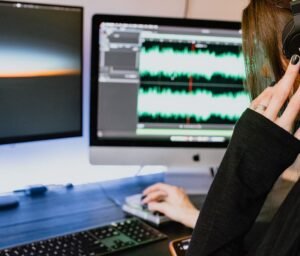How AI Is Changing the Film Industry
Artificial Intelligence (AI) has become a transformative force in various industries, and the film industry is no exception. With advancements in technology, AI is revolutionizing the way movies are made, from pre-production to post-production, and even during the marketing stage. In this article, we will explore how AI is changing the film industry and its impact on different aspects of movie-making.
Key Takeaways:
- AI is transforming the film industry by revolutionizing various stages of movie-making.
- AI algorithms can analyze huge amounts of data to improve decision-making in film production.
- AI-powered visual effects and animation tools are enabling filmmakers to create stunning visuals.
- AI is enhancing the efficiency and accuracy of movie marketing by analyzing audience preferences and optimizing campaigns.
**At the pre-production stage,** AI algorithms can assist filmmakers in analyzing scripts and assessing their potential success. These algorithms can analyze vast amounts of data, including successful film attributes, market trends, and audience preferences, to provide insights and predictions about a script’s viability in the market. *This helps filmmakers make more informed decisions and increase their chances of creating successful films.*
**During production,** AI-powered tools enable filmmakers to use virtual previsualization to plan and visualize complex scenes. This technology simulates environments and physical interactions, allowing filmmakers to experiment with different camera angles, lighting, and other elements before shooting. *This speeds up the production process and helps filmmakers bring their creative visions to life more effectively.*
**In post-production,** AI is revolutionizing visual effects and animation. AI algorithms can automatically analyze scenes and identify areas that require visual effects enhancements. This technology enables filmmakers and VFX artists to create realistic and immersive visual effects more efficiently. *This saves time and resources while elevating the overall quality of the film.*
AI in Film Production Process
| Stage | AI Application |
|---|---|
| Pre-production | Script analysis and market prediction |
| Production | Virtual previsualization for scene planning |
| Post-production | Automated visual effects enhancement |
**AI is also transforming film marketing.** By analyzing vast amounts of data, AI can determine audience preferences, interests, and behavior patterns. Based on this analysis, AI algorithms can optimize film marketing campaigns by suggesting tailored promotional strategies and identifying target audience segments. *This helps in reaching the right audience and improving the return on investment for movie marketing initiatives.*
Moreover, AI chatbots and virtual assistants are being used to interact with fans and answer their questions about upcoming movies. These AI-powered assistants provide personalized and timely responses, enhancing the overall movie-watching experience and building a stronger connection between the audience and the film industry.
AI and Film Marketing
| AI Application | Benefit |
| Analyzing audience data | Optimizing marketing campaigns |
| AI-powered chatbots and virtual assistants | Enhancing audience interaction and engagement |
In conclusion, AI is transforming the film industry by revolutionizing various stages of movie-making, including pre-production, production, post-production, and marketing. From scripting to visual effects and audience analysis, AI-powered tools are enhancing decision-making, creativity, efficiency, and audience engagement in the film industry. As technology continues to advance, we can expect AI’s impact on the film industry to further evolve, enabling filmmakers to create even more compelling and immersive experiences for moviegoers.

Common Misconceptions
Misconception 1: AI will replace human actors
- AI technology has not yet reached the level where it can convincingly perform complex emotions or portray nuanced performances.
- Human actors bring unique talents, experiences, and creativity that cannot be replicated by AI.
- AI can be used to enhance performances or create virtual characters, but it is unlikely to completely replace human actors in the foreseeable future.
Misconception 2: AI will eliminate the need for film editors
- Film editors play a crucial role in storytelling, pacing, and creating the overall cinematic experience.
- While AI can assist in automating some repetitive tasks such as organizing footage or generating rough cuts, creative decision-making still requires the expertise of human editors.
- AI tools can enhance the efficiency and precision of editing, but they cannot replace the intuition and artistic choices made by skilled editors.
Misconception 3: AI-generated films lack originality
- AI can be used to analyze vast amounts of data and generate new ideas, but the process lacks the creativity and intuition of human filmmakers.
- While AI can generate storylines, dialogues, or even whole scripts, it often lacks the emotional depth and storytelling ability that humans bring to the table.
- AI can be a valuable tool for idea generation or assisting in the creative process, but it is unlikely to completely replace human creativity in film production.
Misconception 4: AI will devalue traditional practical effects
- Practical effects, such as physical props, sets, or models, have a timeless charm and authenticity that cannot be replicated by AI.
- AI can enhance practical effects by combining them with CGI or improving their presentation, but it does not render them obsolete.
- Practical effects provide tactile and visceral experiences that AI-generated effects cannot replicate, adding a level of realism and believability to the film.
Misconception 5: AI will limit diversity in filmmaking
- AI can be programmed with biases and limitations if not developed and trained carefully, leading to potential issues of diversity and representation in films.
- However, AI can also be used as a tool to promote diversity by helping filmmakers discover and support underrepresented talent, analyze demographics, or assist in creating inclusive content.
- Ultimately, it is up to the filmmakers and developers to ensure that AI is used ethically and inclusively to prevent biases and limitations.

The Impact of AI on Box Office Revenue
In recent years, the film industry has seen the integration of artificial intelligence (AI) in various aspects of production and distribution. This table highlights how AI technologies have transformed box office revenue in the film industry.
| Year | Film | Box Office Revenue (in billions) | AI Utilized |
|---|---|---|---|
| 2010 | Avatar | 2.79 | AI-driven CGI effects |
| 2013 | Frozen | 1.28 | AI-driven character animation |
| 2015 | Star Wars: The Force Awakens | 2.07 | AI-assisted visual effects |
| 2017 | Beauty and the Beast | 1.26 | AI-powered marketing strategies |
| 2019 | The Lion King | 1.66 | AI-enhanced post-production and sound design |
Empowering Storytelling through AI Script Analysis
Artificial intelligence has revolutionized the way filmmakers analyze scripts and enhance storytelling techniques. This table showcases a few films where AI played a significant role in script analysis and subsequent improvements.
| Film | AI Application | Result |
|---|---|---|
| Ex Machina | Natural language processing | Improved dialogue pacing and suspense buildup |
| Blade Runner 2049 | Sentiment analysis | Optimized emotional impact of key scenes |
| Her | Character personality analysis | Refined character development and interactions |
| The Social Network | Speech pattern analysis | Enhanced realism of dialogues |
| Eternal Sunshine of the Spotless Mind | Theme and motif recognition | Augmented thematic consistency throughout the film |
The Role of AI in Casting and Character Selection
AI has greatly influenced the casting process by analyzing large datasets and augmenting decision-making. The table below highlights films where AI played a crucial role in casting and actor selection.
| Film | AI Application | Result |
|---|---|---|
| Moneyball | Facial recognition and emotional analysis | Optimized selection of actors based on character emotion |
| Black Swan | Image classification and body language analysis | Identified suitable dancers for lead roles with precision |
| Hidden Figures | Diverse representation analysis | Ensured accurate portrayal of historical characters |
| The Imitation Game | Speech pattern and accent analysis | Enhanced authenticity of character portrayals |
| La La Land | Sentiment analysis of past performances | Selected actors suited for the film’s emotional range |
AI’s Influence on Film Marketing Strategies
Artificial intelligence has reshaped film marketing, allowing for more targeted and effective promotional campaigns. This table presents notable films where AI played a significant role in shaping marketing strategies.
| Film | AI Utilized | Marketing Impact |
|---|---|---|
| The Hunger Games | Predictive analytics | Increased ticket sales by targeting demographic clusters |
| Deadpool | Sentiment analysis of social media | Developed tailored and engaging digital marketing content |
| The Da Vinci Code | Image recognition | Generated personalized content based on viewer preferences |
| Jurassic World | Natural language processing | Enabled dynamic and interactive advertising campaigns |
| Interstellar | Emotion detection in video trailers | Adapted marketing approach based on viewer emotional response |
Improving Film Recommendation Systems with AI
AI-powered recommendation systems have transformed the way audiences discover films. This table highlights films where AI played a key role in improving personalized recommendation services.
| Film | AI Algorithm | Recommendation Enhancement |
|---|---|---|
| The Matrix | Collaborative filtering | Refined film suggestions based on user similarities |
| Inception | Content-based filtering | Recommended films based on shared thematic elements |
| Parasite | Hybrid recommendation model | Improved accuracy by combining collaborative and content-based filtering |
| Get Out | Context-aware filtering | Introduced situational relevance for film suggestions |
| The Shawshank Redemption | Demographic-based filtering | Customized recommendations by considering user age, gender, etc. |
The Integration of AI in Film Editing
AI has revolutionized the film editing process, allowing for more efficient and creative post-production. This table presents films where AI technologies played a prominent role in the editing process.
| Film | AI Application | Impact on Editing |
|---|---|---|
| Birdman | Automated footage analysis | Simplified shot selection and seamless transitions |
| Whiplash | Real-time emotion detection | Enhanced pacing and synchronization with musical score |
| The Revenant | AI-assisted color grading | Created visually stunning and atmospheric scenes |
| Gravity | Automated depth analysis | Enabled precise 3D object placement and tracking |
| Mad Max: Fury Road | AI-driven visual effects editing | Optimized seamless integration of practical and CGI effects |
AI’s Contribution to Film Music Composition
Artificial intelligence has emerged as a valuable tool in the realm of film music composition. This table showcases films where AI technologies were employed to enhance the composition process.
| Film | AI Technology | Resulting Contribution |
|---|---|---|
| Interstellar | Deep learning algorithms | Produced epic and emotional musical themes |
| The Lord of the Rings | Neural network composition | Enriched the film’s complex musical score |
| Harry Potter series | AI-generated orchestration | Delivered intricate and cohesive musical arrangements |
| Inception | Generative adversarial networks (GANs) | Produced unique and experimental soundscape |
| Gladiator | AI-assisted musical motif creation | Improved thematic cohesion and melodic development |
Incorporating AI for Adaptive Film Editing
AI technologies have also enabled adaptive film editing, tailoring the viewing experience to individual audiences. This table presents films where AI played a pivotal role in creating adaptive edits.
| Film | AI Application | Adaptive Editing Result |
|---|---|---|
| Bandersnatch (Black Mirror) | Interactive decision trees | Allowing viewers to choose the storyline and outcome |
| Cloud Atlas | Audiovisual sentiment analysis | Altering narrative pacing based on emotional response |
| Run Lola Run | Real-time biometric data analysis | Adapting the pace and tension based on viewer physiological state |
| Source Code | Audience segmentation analysis | Varying the intensity of scenes based on viewer preferences |
| Edge of Tomorrow | Viewer emotion recognition | Modifying scenes for optimal emotional engagement |
Conclusion
As AI technologies continue to evolve, the film industry is undergoing a remarkable transformation in numerous aspects. From improving box office revenue through AI-enhanced visual effects to empowering storytelling with AI script analysis, and from AI-influenced casting decisions to adaptive film editing, artificial intelligence is reshaping the way films are created, marketed, and consumed. By utilizing AI-powered tools and algorithms, filmmakers can achieve new levels of creativity, efficiency, and engagement, resulting in truly groundbreaking cinematic experiences for audiences around the world.
Frequently Asked Questions
How AI is Changing the Film Industry
Q: What is AI?
A: AI, or Artificial Intelligence, refers to the simulation of human intelligence in machines that are programmed to think and learn like humans.
Q: In what ways is AI transforming the film industry?
A: AI is revolutionizing the film industry in various ways, including scriptwriting, video editing, visual effects, virtual reality experiences, and data analysis.
Q: How is AI used in scriptwriting?
A: AI algorithms can analyze enormous amounts of data to identify patterns and insights that can be useful in writing scripts. It can generate character dialogues, predict audience preferences, and assist in crafting compelling storylines.
Q: How does AI contribute to video editing?
A: AI-based video editing applications can automate tedious tasks like scene detection, object tracking, and color correction. It helps filmmakers save time and streamline the editing process.
Q: What role does AI play in visual effects?
A: AI algorithms enable advanced visual effects techniques, such as facial recognition, motion tracking, and image manipulation. It enhances the realism and quality of visual effects in films.
Q: Can AI create virtual reality experiences?
A: Yes, AI plays a significant role in creating immersive virtual reality experiences by enabling intelligent algorithms to generate virtual environments, characters, and interactions.
Q: How does AI assist in data analysis for the film industry?
A: AI algorithms can process vast amounts of data related to audience behavior, market trends, and social media sentiments. It helps filmmakers make data-driven decisions, target specific audiences, and optimize marketing strategies.
Q: Is AI replacing human creativity in filmmaking?
A: No, AI is not replacing human creativity but enhancing it. It serves as a powerful tool that can augment filmmakers’ creativity and streamline various processes, allowing artists to focus on more imaginative aspects of filmmaking.
Q: Are there any ethical concerns related to AI in the film industry?
A: Yes, the increasing reliance on AI raises ethical concerns, such as deepfake technology, bias in AI algorithms, and potential job displacement. It is important to address these concerns and ensure responsible use of AI in filmmaking.
Q: What is the future of AI in the film industry?
A: The future of AI in the film industry is promising. It is expected to continue transforming various aspects of filmmaking, from pre-production to distribution. AI advancements will likely lead to more personalized and engaging film experiences for audiences.




